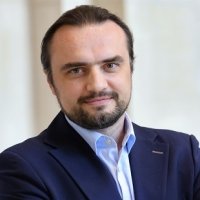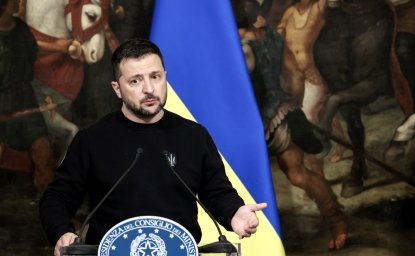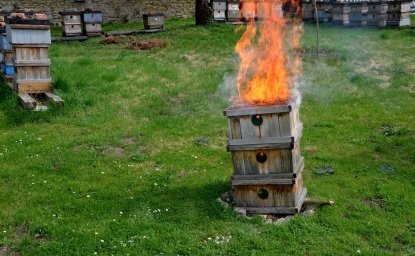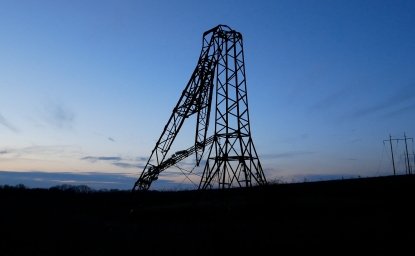
A blog of the Kennan Institute
BY ARTEM GERGUN
Finding a path to peace in eastern Ukraine has never been easy. During his election campaign, Volodymyr Zelenskyy vowed to deliver a peaceful settlement of the military conflict in Donbas and promised an agreement with Russia on the matter. He heavily criticized his main rival, former president Petro Poroshenko, not only for corruption but for backing the multilateral Minsk Agreements instead of working directly with Russia. However, once in office, the newly elected president of Ukraine had no choice but to follow in the footsteps of his predecessor. Unlike in domestic politics, in foreign affairs there is no room for solo players. In the modern world, a country’s foreign relations are characterized by multilateral commitments.
Into this stalemate stepped an unexpected player, President Emmanuel Macron of France.
Building an “Architecture of Trust” While Protecting French Interests
A possibly decisive move in the peace process originated not in Berlin or Kyiv but in Paris. The recent prisoner swap between Russia and Ukraine would likely not have been possible without the intervention of President Macron. It is worth mentioning that candidate Zelenskyy was well-received at the Élysée Palace nine days before Ukraine’s presidential elections. However, these events should be seen in the wider context of developing Franco-Russian relations rather than viewed as undertaken solely to end the war in the Donbas.
In his annual address to the French diplomatic corps in August 2019, Emmanuel Macron placed great emphasis on Russia, telling the assembled diplomats that Europe would “disappear” if it failed to rethink its strategy toward Russia. “Some of our allies will always push us towards imposing more sanctions, but that is not in our interest. We need to build an ‘architecture of trust’ in Europe,” the French president said. Many observers were caught by surprise, since only a couple of days earlier Macron had stated that inviting Russia to the G-7 next year would be “a strategic mistake.”
Why the pivot? Is it just a short-lived warming of bilateral relations, or something more? In any case, Macron has devoted a lot of energy and resources to this process. His August 19 meeting with Vladimir Putin at Fort de Brégançon, the summer home of the French president, was followed by a 2+2 meeting between the French and Russian minsters of foreign affairs and defense. The indications are that the first step in building an architecture of trust between Moscow and Paris has been taken.
Macron’s emphasis on trust is not accidental. Russia is a key player in a range of conflicts affecting French interests. For example, Russia is selling weapons to such troubled African countries as Mali and Algeria, which are important trade partners for Paris in precious metals, oil, and gas. Another significant issue is the Iranian nuclear deal, abandoned by U.S. President Donald Trump. Macron has been trying to launch a credit line to pre-purchase Iran’s oil, but it is not clear whether the United States will sanction that move. In the wake of Trump’s Twitter diplomacy toward Putin and the ousting of such hawks as national security adviser John Bolton from the U.S. administration, Macron hopes to strike better relations with Russia and protect the French stakes in Africa and Asia.
Ukraine’s Response
The French détente initiative was met halfway in Kyiv. Igor Kolomoyskyy, a wealthy businessman who underwrote Zelenskyy’s run for president and remains a close associate, said that the economic reintegration of the Donbas was more important than a political solution, hinting that certain concessions on the Ukrainian side might be possible. Vadym Prystayko, the newly appointed minister of foreign affairs, admitted that Kyiv is working on the details of elections in Donbas under the “Steinmeier formula” (favored by Russia) and said there is nothing alarming about it.
However, this optimism was quickly deflated by U.S. Special Representative for Ukraine Negotiations Kurt Volker. “In order to have free and fair elections, you need to have a free and fair, and secure environment. So, security has to come first,” the American diplomat said. In other words, political concessions of the sort Kolomoyskyy hinted at are not acceptable.
Moscow got the message. Russian foreign affairs officials excluded the possibility of a new Normandy Four summit unless details of the Steinmeier formula were explicitly outlined. (The Steinmeier formula was proposed by German president Frank-Walter Steinmeier during his time as foreign minister; it recommends that free and fair local elections be held in the Russian-occupied Donbas under Ukrainian law, with the region receiving special self-governance status in exchange.)
A pledge to end the war in the Donbas is easy to make but very difficult to deliver on. Volodymyr Zelenskyy is learning this lesson the hard way. In fact, he is facing the same dilemma as his predecessor did: political concessions cannot be made if security conditions are not met first. It is the main stumbling block to enacting the Minsk Agreements, and more than five years of Normandy Four work by the leaders of France, Russia, Ukraine and Germany have not been able to make a dent in the problem.
Kyiv is running out of options. Basically, there are only two ways out of this impasse. The first way is to follow up on Petro Poroshenko’s idea to hand off the security issue to a peacekeeping mission under the auspices of the United Nations. This option seems less attractive for Zelenskyy as it would allow Poroshenko to score political points as the leader of a major opposition faction in parliament. The second way is to tackle the problem on a bilateral level, which would entail direct contact with the leaders of the self-proclaimed Donbas republics of Luhansk and Donetsk. The latter path would be a much riskier option for Zelenskyy than the former.
The political risks dogging any attempted settlement of the Donbas conflict mean the conflict is destined to continue for some time. As for Macron’s pivot to Moscow, the impetus is likely multipronged and includes a protection of French interests, improving Franco-Russian relations, and a desire to knit together the European community in anticipation of Angela Merkel’s stepping down as chancellor of Germany. However, Macron must include in his calculations the unpredictability of U.S.-Russia relations before approaching the problem of the Donbas. That said, his behind-the-scenes intervention to address a circumscribed problem in Kyiv-Moscow relations had a happy ending for seventy Ukrainian and Russian prisoners, who finally made it home.
Author

Advisor to Chairman of the Economic Affairs Committee MP Dmytro Natalukha, Verkhovna Rada, the Parliament of Ukraine

Kennan Institute
The Kennan Institute is the premier US center for advanced research on Eurasia and the oldest and largest regional program at the Woodrow Wilson International Center for Scholars. The Kennan Institute is committed to improving American understanding of Russia, Ukraine, Central Asia, the South Caucasus, and the surrounding region though research and exchange. Read more

Explore More in Focus Ukraine
Browse Focus Ukraine
Building a Thriving Ukrainian Design Community Now

Ukraine Seeks to End the War. What's Wrong With the “Peace Scenarios”?


